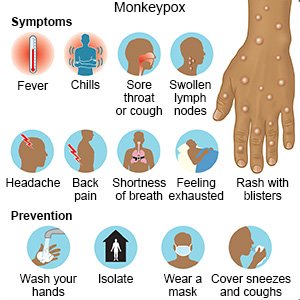A Medical Professional, Dr Francis Sanwo, says reducing the risk of human-to-human transmission, surveillance and rapid identification of new cases are critical for Mpox outbreak containment.
Sanwo, Managing Director of Our Lady of Apostles Catholic Hospital, Oluyoro, Ibadan, made the assertion in an interview with the News Agency of Nigeria (NAN) on Thursday in Ibadan.
He said that health workers caring for patients with suspected or confirmed Mpox virus infection, or handling specimens from them, should implement standard infection control precautions.
“If possible, persons previously vaccinated against smallpox should be selected to care for the patient,” he said.
According to him, Mpox is a viral zoonosis (a virus transmitted to humans from animals) with symptoms similar to those seen in the past in smallpox patients, although it is clinically less severe.
According to him, it is usually a self-limiting disease with the symptoms lasting from two to four weeks, saying severe outcomes can also occur.
“Animal-to-human (zoonotic) transmission can occur from direct contact with the blood, bodily fluids, or cutaneous or mucosal lesions of infected animals.
“Human-to-human transmission can result from close contact with respiratory secretions, skin lesions of an infected person or recently contaminated objects.
“Transmission via droplet respiratory particles usually requires prolonged face-to-face contact, which puts health workers, household members and other close contacts of active cases at greater risk.
“Transmission can also occur via the placenta from mother to fetus (which can lead to congenital Mpox) or during close contact during and after birth,” he told NAN.
Sanwo said that Mpox could be prevented by avoiding eating or touching animals known to acquire the virus in the wild (mainly African rodents and monkeys).
The physician said patients with the disease should physically isolate themselves until all of the pox lesions had healed, while caregivers should obtain a smallpox vaccination.
“Because smallpox and Mpox are so closely related, studies have suggested that people vaccinated against smallpox have about an 85 per cent chances of being protected from Mpox.
“Although vaccination against smallpox was protective in the past, today persons younger than 40 to 50 years of age (depending on the country) may be more susceptible to Mpox due to cessation of smallpox vaccination campaigns globally after eradication of the disease.
“Patients with depressed immune systems and those who are allergic to latex or smallpox vaccine should not get the smallpox vaccine.
“Anyone else who has been exposed to Mpox in the past 14 days should get the smallpox vaccine, including children under one year of age, pregnant women, and people with skin conditions,” he said.
Sanwo stressed that clinical care for Mpox should be fully optimised to alleviate symptoms, manage complications and prevent long-term sequelae.
He said patients should be offered fluids and food to maintain adequate nutritional status while secondary bacterial infections should be treated as indicated.
“An antiviral agent known as tecovirimat that was developed for smallpox was licensed by the European Medicines Agency (EMA) for Mpox in 2022, based on data in animal and human studies.
“But, is not yet widely available,” the medical expert said. (NAN)


